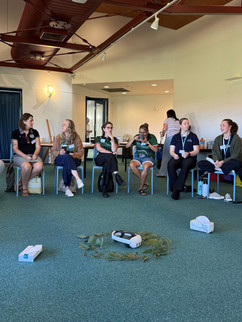Grounded in Connection: First Nations-Led, Trauma-Informed Training
- Oct 7, 2025
- 3 min read
Updated: Oct 10, 2025
Human service practitioners came together in Gladstone for First Nations-Led, Trauma-Informed Training Series co-faciliated by BilaEmpower and Yaleela Torrens, local Gooreng Gooreng and Bunjalung woman and Social Worker living and working on ancestorial lands.
This training was the first opportunity for practitioners supporting children and families in the region to participate in training of this kind, grounded in local First Nations context and shaped by local needs and voice informed by an initial online discovery session.
At the beginning of the in-person workshop in August, participants gathered in circle holding eucalyptus leaves crushed by their fingers to their nose and inhaled deeply. This simple practice introduced the power of connection to Country and activation of senses to calm and regulate our nervous system, to be present and intentionally hold space. This practice framed key learnings: trauma-informed practice begins in the body, is grounded in Country, and strengthened through connection.
The training offered deeper, transformation learning greater than cultural awareness. It sparked shifts in participant’s perspectives and seeded a community of practice committed to learning through a First Nations, trauma-informed lens.
“Creating trauma-informed communities requires more than good intentions – it takes holding space, challenging systems, and committing to learning, unlearning, and shared understanding. When we do this together, we create the foundation for services and supports that truly meet people where they are.” – Participant
Participants shared stories, challenged assumptions, and leaned into discomfort. Brave conversations surfaced real challenges like rigid systems, impacts of colonisation, and fear-based inaction. Participant reflections on the learning experience:
“I am walking away with a changed perspective and commitment to lifelong learning.” – Participant
“Today was powerful, insightful, safe – and it really encouraged me to challenge what I think I know.” – Participant
“I really appreciated the gentle challenging of my assumptions about whether I am being genuine in my relationships.” – Participant
The training highlighted how behaviours often seen as ‘problems’ can actually be survival responses to trauma. First Nations and western trauma frameworks were explored and showed how different worldviews shape unique approaches to wellbeing.
The First Nations framework emphasised slowing down, listening deeply, and building genuine connection as the foundation for support. Healing was seen not only as an individual journey but as something that is strengthened through family, culture, Country, and community. Working at the pace of the client was highlighted as essential for building trust and creating safety.
Since the training, one participant shared that their understanding of intergenerational trauma has deepened significantly. They reflected that this shift has already led to positive changes in how they connect and communicate with students and work colleagues, strengthening everyday relationships and sharing learnings through conversations.
Participants learned together that cultural safety is a relational practice, shaped by care, respect, intentional connection.
“This training is deeper than cultural awareness and more than ticking a box for workplace compliance. It is the first step in supporting our region to change the narrative and make the connections to rebuild our villages.” – Participant
The training forms part of the Sector Capacity Building Initiative, informed by our local Human Service Sector on priority collective training needs, to enable improved outcomes for our families and children.
To learn more about the Sector Capacity Building Initiative and the community partnership with Rio Tinto, Here for Gladstone, read Collective Buying Power and Community Partnership Enabling Improved Outcomes for Families and Children, or contact GRT:
P: 07 4970 7382
W: Together in Learning Webpage













